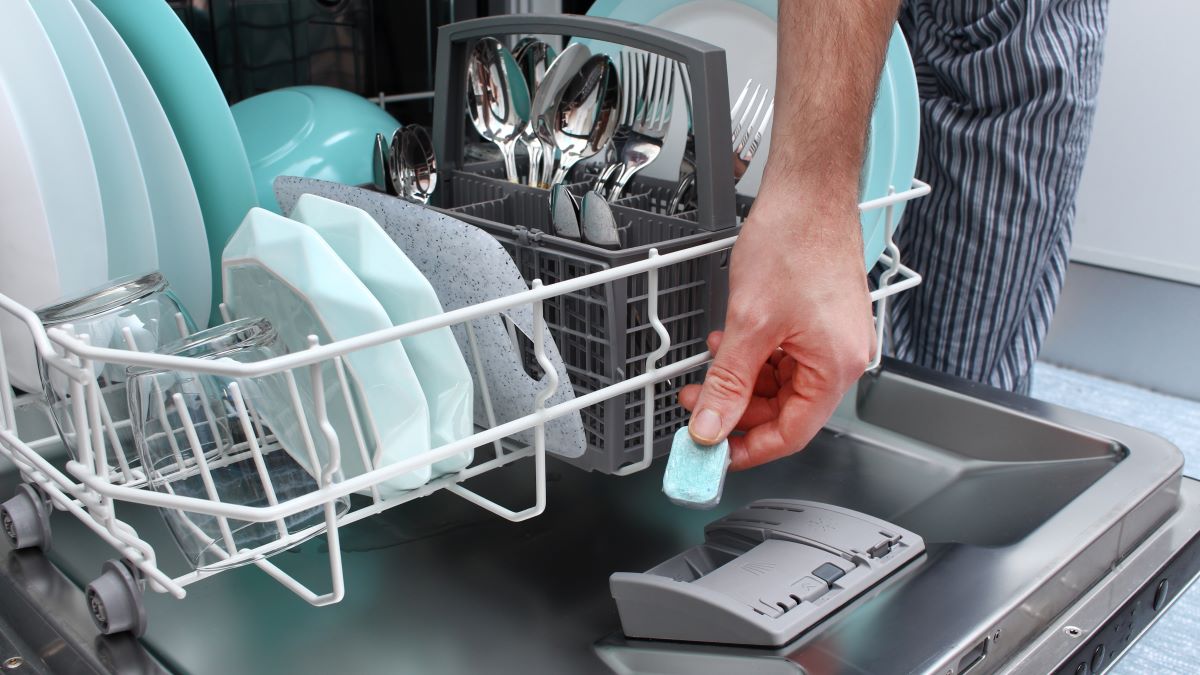The Environmental Impact of Washing Dishes

One of many ironies of modern life is that the products we use to make our homes clean contribute to pollution and environmental destruction. But no matter how negative the environmental impact of dish soap is, you can’t just avoid it the way you can other product categories.
Disposable dishes are no better for the environment than dish soap, and eating off of dirty dishes is a good way to get sick. You probably can’t easily replace plates with banana leaves; so how do you find the least dirty product to keep your dishes clean?
This article contains affiliate links. If you purchase an item through one of these links, we receive a small commission that helps fund our Recycling Directory.
Dishwasher or Hand-Wash Dishes?
It may be counterintuitive, but using a dishwasher is usually more efficient than hand-washing dishes. And picking an efficient washer will have a greater impact over its lifetime than any choice of cleanser. But everyone has some dishes that are not dishwasher safe, and sometimes you want to clean a particularly dirty dish without waiting until the dishwasher is full.
For times when you need to hand-wash dishes, Earth911 has recommended Honest Company Dish Soap in the past. AspenClean makes the only Environmental Working Group (EWG) Verified liquid dish soap, although several brands, including 9 Elements and Attitude earn an A rating.
Climate Change
The University of Colorado performed a life cycle analysis (LCA) that looked at several kinds of cleaner; the top three impacts of dishwashing detergents were all related to climate change. Although a likely culprit, transportation was not the largest contributor to climate impacts, coming in a distant third to product use and formulation.
Product use was the biggest factor, largely because of the electricity used to heat dishwaters. However, the study defines the climate impacts of product formulation less clearly. Labeling laws for cleaning products are lax, but most dish soaps — for hand-washing and for dishwashers — are detergents rather than true soaps; these products are made from a petroleum base, just like the plastic containers they come in.
True Green Organics claims to make a petroleum-free dish cleaner for the dishwasher and hand-washing dishes. Although it does not appear to have any certifications, the ingredient list is short and simple. There are some USDA-certified organic dish soaps, but they can be hard to find. Look for GreenShield Organic automatic dish detergent or Orgaia Natura dish soap.
Toxicity
EPA’s Safer Choice label certifies that a product only uses ingredients from EPA’s Safer Chemicals List. The Environmental Working Group has a more stringent verification system. The Colorado LCA found that sodium lauryl sulfate had the greatest environmental impact. Note, however, that the study only included greener cleaning brands Method and Ecover, which may be free of many harmful chemicals that are commonly found in other detergents. The study was performed in 2015 before both of those companies were purchased by SC Johnson, which caused Britain’s Ethical Consumer to withdraw their recommendation of the brands.
Antibacterial detergents do not provide any added protection against viruses like COVID. The overuse of antibiotics is likely to contribute to the rise of antibiotic-resistant strains of bacteria. Their use in dishwashing releases antibiotics into the water cycle — wastewater treatment does not completely eliminate antibiotics — and increases the risk of accidental ingestion of antibiotics if dishes are not thoroughly rinsed. The FDA encourages consumers to avoid antibacterial soaps.
Packaging
Packaging type and its resulting waste are easy targets for consumer attention. But they form a relatively small portion of the product’s footprint.
The LCA referenced above focused on green dish soap brands whose product formulas presumably have less impact. Packaging would likely be an even smaller portion of the footprint of a standard dishwashing detergent. However, if you have a choice among nonpetroleum-based detergents, choose minimal and recyclable plastic-free packaging. Although pricey, Blueland’s fragrance-free dishwasher tablets are EWG-verified and come in refillable plastic-free containers. They package refills in compostable paper.
DIY
It is also possible to make your own dishwashing detergent and even to use it in the dishwasher. With a DIY approach, you know exactly what ingredients you are using, so you avoid any unfamiliar chemicals. It might seem like a hassle. But the challenges of tracking down an affordable, nontoxic, petroleum-free dishwashing detergent put the effort in perspective.
But don’t forget that how you wash is more important than what you wash with. Avoid pre-rinsing and deselect the “heated dry” setting to significantly reduce the greenhouse gas emissions associated with dishwashers. Fill the sink to cut emissions by two-thirds instead of running the water while washing dishes by hand. Even if you don’t have the time and money for the lowest impact detergent, you can still cut your dishwashing footprint.
I am lucky to have found a great health shop here called Camamil-la which I use a lot to buy my washing up liquid from. I just take an empty bottle (glass of course!) along and they refill it for me. It's a lot cheaper and environmentally friendly too! I don't have a dishwasher, I tried one and frankly was not impressed at all.
The blog song for today is: " This Ole House" by Shakin Stevens
TTFN



No comments:
Post a Comment